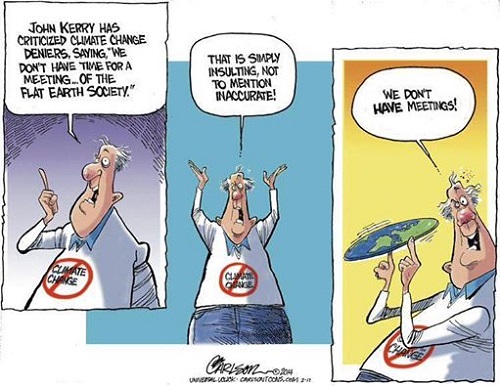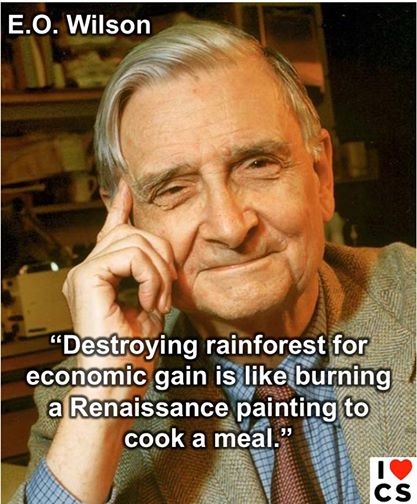2014 SkS Weekly Digest #32
Posted on 10 August 2014 by John Hartz
SkS Highlights
Air pollution and climate change could mean 50% more people going hungry by 2050, new study finds* by Roz Pidcock has generated a very lively comment thread. The posts by SkS authors and other SkS regulars contain a wealth of quality information.
*This is a repost of an article originally published on The Carbon Brief.
El Niño Watch
The El Niño that seems to be trying to form in the tropical Pacific Ocean is looking a little less likely now, though the chances of it developing are still double the normal odds, forecasters said in the latest monthly update on the cyclical climate phenomenon, released Thursday.
That update lowered the odds of an El Niño occurring in fall and early winter to 65 percent, down from 80 percent last month. But “we’re still fairly confident that El Niño will come,” said Michelle L’Heureux a meteorologist with the National Oceanic and Atmospheric Administration’s Climate Prediction Center, who puts out the El Niño forecasts along with the International Research Institute for Climate and Society at Columbia University.
Odds of El Niño Drop; Still Expected to Form by Andrea Thompson, Climate Central, Aug 7, 2014
Toon of the Week

h/t to I heart Climate Scientists
Quote of the Week
"As an African, there are no clean emissions or dirty emissions. Whether they emissions are from China, emissions from the United States ... that doesn't keep me safe as an African," said Tosi Mpanu-Mpanu, lead negotiator for the Democratic Republic of the Congo.
"We have a saying that when two elephants fight, the grass suffers. We don't want to be the grass under the U.S. and China," he said.
African negotiators urge U.S. leadership for UN climate deal by Valerie Volcovici, Reuters. Aug 6, 2014
SkS in the News
A particular denier's obsession with Quantifying the consensus on anthropogenic global warming in the scientific literature, Cook et al, 2013, Environmental Research Letters, is dissected in Sou's Hot Whopper post, Irony alert! More conspiracy plots discovered at WUWT and elsewhere...
The SkS article, Drought and Global Climate Change: An Analysis of Statements by Roger Pielke Jr , is linked to by Daniel Kessler in his Huffington Post article, Roger Pielke, Jr. leaves FiveThirtyEight, and What It Means for Changing the Media on Global Warming.
Greg Laden's blog post, How to talk to your uncle who thinks global warming is a hoax?, includes the following endorsement of SkS.
"I’m frequently asked what resources people can use to learn about the arguments, both the denialist arguments themselves and how to counter them. If I provide information on one resource, it is always skepticalscience.com. That web site is very nicely organized, it includes all of the denialist arguments (if you know of a denialist argument skepticalscience.com does not cover, let them know, or if you like, let me know and I’ll pass it on). The primers that address the arguments are often provided at multiple levels, so you can get the non-technical tl;dr, or you can go into the details."
Thank you, Greg.
SkS Spotlights
The International Groundwater Resources Assessment Centre (IGRAC) facilitates and promotes world-wide exchange of groundwater knowledge to improve assessment, development and management of groundwater resources.
The idea of an IGRAC - an initiative of UNESCO and WMO - was first launched at the "Fifth International Conference on Hydrology" in February 1999. In the years after, thorough discussions and consultations took place in order to define the scope, role and objectives of IGRAC. By early 2003, IGRAC has operationalised its activities, aiming at benefiting the entire international groundwater community with services on a free-of-charge basis. IGRAC operates under the auspices of WMO and UNESCO (as UNESCO Institute - Category II). Like our in-house partner the UNESCO-IHE, the Centre is based in Delft, The Netherlands.
Poster of the Week

SkS Week in Review
- 2014 SkS Weekly News Roundup #32B by John Hartz
- Air pollution and climate change could mean 50% more people going hungry by 2050, new study finds by Roz Pidcock
- Facts can convince conservatives about global warming – sometimes by Dana
- 2014 SkS Weekly News Roundup #32A by John Hartz
- Scientists lambast The Australian for misleading article on deep ocean cooling by Roz Pidcock
- A Relentless Rise in Global Sea Level by Rob Painting
- Harvard historian: strategy of climate science denial groups 'extremely successful' by Graham Readfearn
Coming Soon on SkS
- New consensus paper (John Cook and Bart Verheggen)
- New study finds fringe global warming contrarians get disproportionate media attention (Dana)
- Global warming is moistening the atmosphere (John Abraham)
- Climate scientists dub this year’s El Niño “a real enigma (Roz Pidcock)
- How will El Nino impact weather patterns? (Guest post)
- 2014 SkS Weekly News Roundup #33 (John Hartz)































 Arguments
Arguments






























Comments